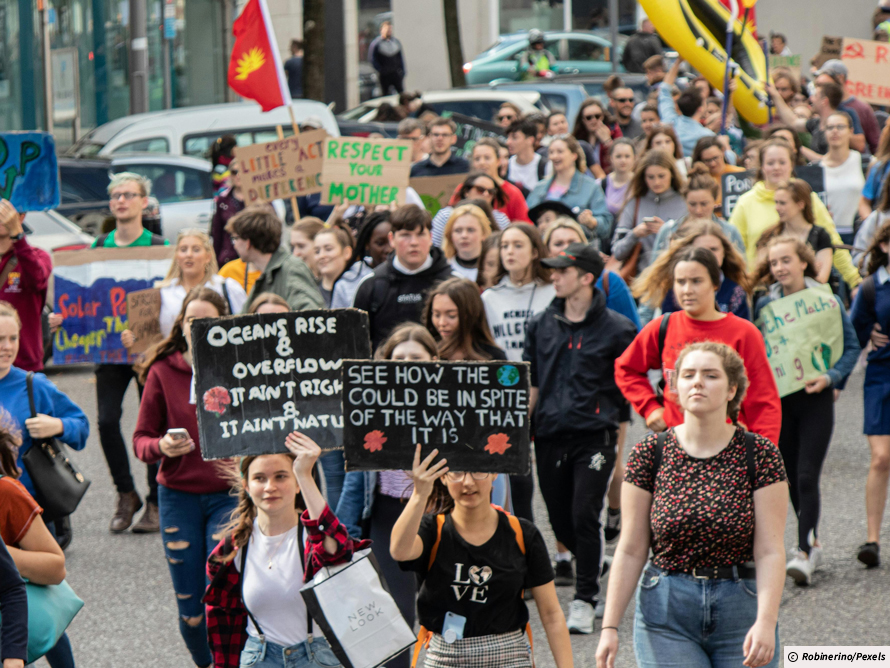Humanity faces an existential battle against climate collapse and we need technology to come to the rescue, says Cici, 17, from Yew Chung International School in Hong Kong.
As citizens in the world, our task is to confront a key question: is technology a double-edged sword that threatens worsening the climate crisis?
Let us examine some facts: 2023 smashed all global heat records, with July registering as the hottest month in 120,000 years, according to the data provided by Copernicus Climate Service.
Our oceans are reaching bathtub temperatures – Florida’s waters hit 38C last summer, killing entire coral ecosystems in days, according to NOAA, the US National Oceanic and Atmospheric Administration.
Meanwhile, a report in the journal Nature notes that Antarctica’s Thwaites Glacier, nicknamed the “Doomsday Glacier” because of its potential to trigger a catastrophic rise in sea level, is crumbling three times faster than predicted. This is not just climate change – it is complete climate breakdown.
While technology helped create this crisis, it must now become our most powerful weapon to fight back.
The clock is ticking.
As a high school student and as a citizen of the planet, I have witnessed this crisis unfolding in real time. Summer in my city is hotter than ever. I remember when I was a child, it was only about 30C, whereas now it is frequently closer to 40C.
Winter weather also no longer follows predictable patterns. I have read about freak hail storms in the north of China, and tornadoes across the world.
According to the IPCC, the Intergovernmental Panel on Climate Change, global temperatures have risen by 1.1C since the pre-industrial era, pushing ecosystems to their limits. However, despite the overwhelming evidence, action remains extremely slow.
From renewable energy to carbon capture, technology gives us powerful tools to fight climate change, but innovation alone is not enough. For example, electric vehicles are considered green alternatives by most of us, but their production depends on mining, which can be extremely damaging to the natural environment.
Meanwhile, billionaires are pouring resources into space colonisation while ignoring the crisis at home. This disconnect makes me so angry. We cannot rely on half-measures or illusions of a future where we can solve our problems outright.
What we need is systemic change. Governments must impose stricter regulations on polluters and companies must be held accountable for their polluting.
As young citizens, we are often perceived as inexperienced or naive, but our voices matter. Movements like Future Fridays, which have mobilised millions of people around the world, demonstrate the power of youth activism.
Social media amplifies our message, but the labels we get from social media alone will not save the planet. We must take action: as students, we can advise schools to regularly teach sustainability.
The time for passive hope is over. If we want a future, we must act now – not as bystanders, but as the generation that refused to look away. Our planet cannot wait.
Let’s join together to use technology in our daily life to help solve the situation.
Interested in submitting your own Student Voices article or video? Find out more here.



Queen Elizabeth's Boys School, Barnet, London, UK, Europe, Earth, Solar System, The Milky Way - 8H
Our class thinks:
I think we should we try and find tech which benefits us and doesn’t destroy things
Technology should help spread awareness about climate change
Billionaires should help with the climate crisis instead of worsening it
Technology could be an excuse for governments to do certain things and their should be change for this
Technology is a good thing cause back in the days, there wasn’t AI, but now there is, and it has MASSIVELY changed our education system benefiting us students in our learning
Their should be policies in place: LISTEN TO GRETA THUNBERG/ Mr Lawson
Tech can help shape people’s worldviews for instance the articles like the day
Maria - Amman Academy
Thanks for this article. I was reading another article on The Day about nuclear fusion (rather than fission) which may one day hold the answer to the energy crisis. As a teacher, I just want to encourage the younger generation to have hope, that despite the uncertainties of climate change in the world, humans have survived and persevered throughout the centuries. We survived the Ice Age! There will be change in the way we live our lives but we will find a way to survive on our beloved planet.